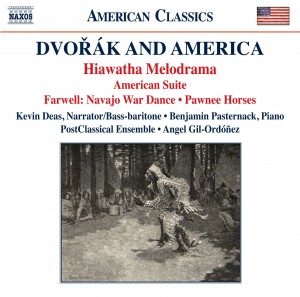When commercial radio was new, the airwaves were saturated with classical music – not just recordings and live concerts, but highly produced pedagogical programs. You could tune into Abram Chasins for tips on playing Chopin’s E-flat major Nocturne.
What today passes for classical music radio is a different species of broadcasting. You can spend an afternoon listening to the 50 greatest hits (scientifically culled) in their latest, most generic studio incarnations. Older recordings are shunned. Talking is avoided as a plague upon the listener.
A fellow named David Osenberg has courageously crafted an alternative template. It’s called WWFM Classical Radio and anyone can tune in anytime because it’s streamed internationally. At Dave’s invitation, PostClassical Ensemble now has its own “PostClassical” series on WWFM. These two-hour shows are nationally unique. They’re thematic. They’re crammed with commentary – not just knowledge and opinion, but learned debate. The three participants – myself, PCE Music Director Angel Gil-Ordondez, and host Bill McGlaughlin – are frequently flying in different directions. And Bill – who comes to radio as a conductor and musical advocate of long experience – is additionally prone to personal anecdotes and historical digressions that temper my obsessive harangues.
We began with a show challenging Ricardo Muti’s assertion that orchestras are better than ever, sampling amazing recordings from the thirties and forties, when orchestras were better than now.
Then came our Lou Harrison Centenary tribute.
The latest installment, just up, is “Dvorak and Hiawatha.” Like the Harrison show, it features PCE recordings for Naxos – which, like WWFM, enthusiastically supports our attempts to do everything differently.
I believe “Dvorak and Hiawatha” has to be one of the most provocative treatments of American music ever aired on American radio. My premise – which Angel supports and Bill resists – is that Dvorak became an “American composer.” Is the New World Symphony directly inspired by Longfellow’s The Song of Hiawatha? Does it end with a dirge signifying Hiawatha’s departure into “the purple mists of evening”? Angel and I think so. Bill isn’t so sure. He sees Aaron Copland as an heir to Dvorak. Not I; Copland balked at using the “Negro melodies” Dvorak adored. A truer heir, to my way of thinking, was George Gershwin. Or the American Bartok: Arthur Farwell.
Our shows spill beyond the allotted two hours. But Dave posts everything. Here’s a Listening Guide for “Dvorak and Hiawatha”:
Part I: THE HIAWATHA MELODRAMA
7:00 – How the Dance of Pau-Puk Keewis inspired the Scherzo from Dvorak’s New World Symphony
12:30 – Why does Dvorak’s symphony end with a dirge? Hiawatha’s Departure
17:50 – The Larghetto from Dvorak’s Violin Sonatina as a picture of Minnehaha and Minnehaha Falls
26:10 – Dvorak’s American Suite and his Indianist mode
33:00 – The complete Hiawatha Melodrama, with Kevin Deas and PostClassical Ensemble conducted by Angel Gil-Ordonez, on PCE’s Naxos “Dvorak and America” CD
Part II: DVORAK’S AMERICAN SUITE
4:25 – Does the opening evoke Jerome Kern?
5:40 – The second movement’s “plantation song”
8:20 – The third movement’s minstrel dance, plantation song, and Indian elegy
12:20 – What defines Dvorak’s Indianist trope?
13:13 – How an Indian dance becomes a minstrel song in the finale
15:35 – Why this is not “program music”
17:35 – The complete American Suite, performed by pianist Benjamin Pasternack on PCE’s Naxos “Dvorak and America” CD
39:00 – Why is Dvorak’s “American style” more than an “American accent”?
40:02 – The Dvorak Humoresques in G-flat and F major (sounds like Gershwin), with pianist Benjamin Pasternack
53:00 – Dvorak vs Aaron Copland – why Gershwin is the real heir to Dvorak
Part III: THE AMERICAN BARTOK: ARTHUR FARWELL
00:50 – Farwell’s Indian War Dance No. 2, performed by Benjamin Pasternack
6:06 – Farwell’s “Pawnee Horses,” in versions for piano (Benjamin Pasternack) and 16-part a cappella chorus (The University of Texas Chamber Singers conducted by James Morrow)
17:00 – Dvorak/Fisher: “Goin’ Home,” sung by Kevin Deas with PCE conducted by Angel Gil-Ordonez
TO PURCHASE PCE’S “DVORAK AND AMERICA” ON NAXOS: click here
TO LEARN MORE ABOUT DVORAK AND AMERICA: click here


Leave a Reply